Nato accuses Russia of violating Ukraine sovereignty
- Published
Nato Secretary General Anders Fogh Rasmussen: "Russia is blatantly violating Ukrainian sovereignty"
Nato has accused Russia of a "blatant violation" of Ukraine's sovereignty and engaging in direct military operations to support pro-Russian rebels.
Secretary-General Anders Fogh Rasmussen said that "despite hollow denials", it was now clear that Russia had illegally crossed Ukraine's border.
He said Nato would respect any Ukrainian decision on security, after its PM said he was putting the country on course for Nato membership.
Russia denies sending troops and arms.
Russian President Vladimir Putin blamed the Ukrainian government for the crisis, comparing its siege of two cities held by separatists, Donetsk and Luhansk, to the siege of Leningrad by Nazi Germany in World War Two.
"It is necessary to make the Ukrainian authorities start substantial talks [with the rebels]," he said.
Putin: "The situation sadly reminds me of the Second World War"
Nearly 2,600 people have been killed since April, the UN says, when Russia's annexation of Crimea prompted the rebels to take control of large parts of Donetsk and Luhansk regions.
Heavy fighting is continuing near Ukraine's strategic port of Mariupol, on the Azov Sea. Rebel forces are trying to capture the city but Ukrainian government troops are digging in.
The rebel advance there has raised fears that the Kremlin might seek to create a land corridor between Russia and Crimea.
On Thursday the separatists seized the nearby town of Novoazovsk.
Separatists are also reported to have surrounded government soldiers in several places further north, near Donetsk city.
Ukrainian forces near the town of Ilovaysk say they are cut off and have been urgently asking for supplies and reinforcements.
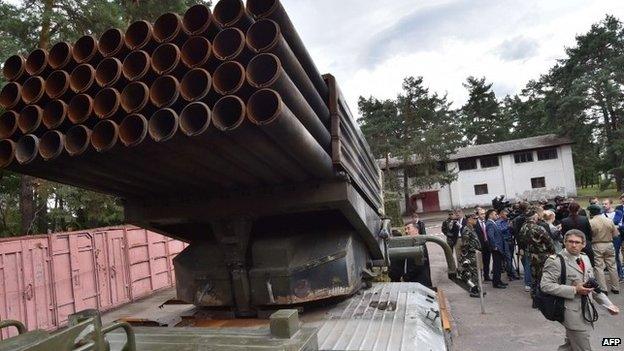
Ukraine has long insisted Russian is sending troops and hardware to support eastern rebels
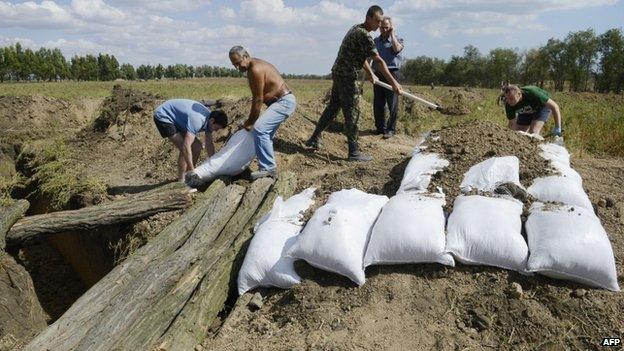
Residents of Mariupol are digging trenches to help Ukrainian soldiers defend the strategic port city
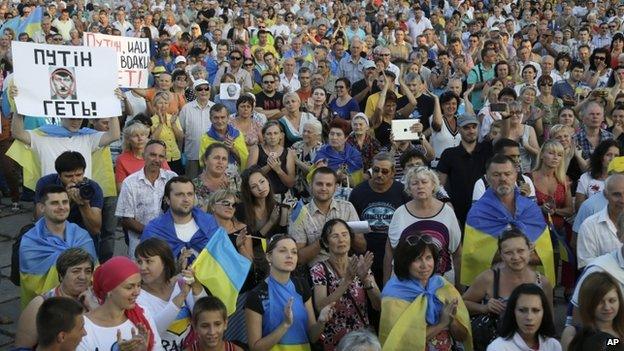
An anti-war rally was held in Mariupol on Thursday
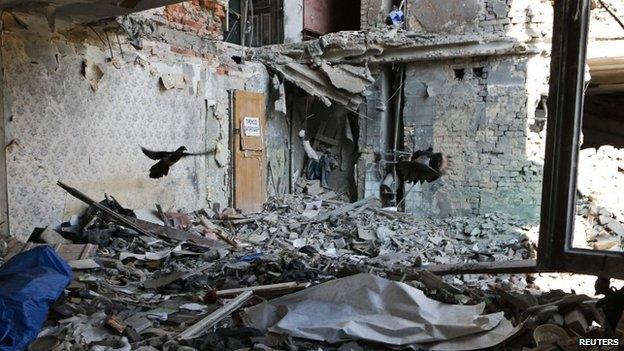
Many buildings have been destroyed in heavy fighting in Donetsk region
Earlier, Ukrainian Prime Minister Arseny Yatsenyuk said the government was reopening the question of Nato membership.
He said it was sending a bill to parliament calling for Ukraine's non-aligned status to be cancelled, in effect paving the way for Ukraine to join Nato.
'Dangerous pattern'
Speaking at a news conference after an emergency meeting of Nato ambassadors, Mr Rasmussen said that it was clear Russia was engaged in direct military operations in Ukraine.
"This is not an isolated action, but part of a dangerous pattern over many months to destabilise Ukraine as a sovereign nation," he said.
"This is a blatant violation of Ukraine's sovereignty and territorial integrity. It defies all diplomatic efforts for a peaceful solution."
On Thursday, Nato had released satellite images it said showed columns of Russian armed forces inside Ukrainian territory, adding that more than 1,000 Russian troops were operating inside Ukraine.
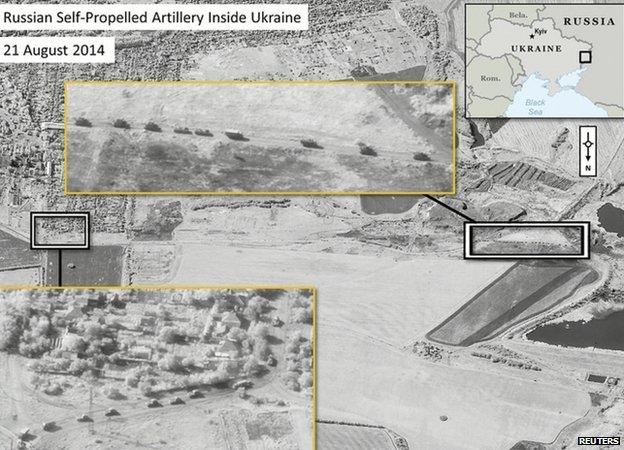
This satellite image provided by the Supreme Headquarters Allied Powers Europe shows what Nato identifies as Russian self-propelled artillery in Ukraine

Mr Rasmussen called on Russia to cease military action, stop supporting the rebels and "take immediate and verifiable steps towards de-escalation of this grave crisis".
Mr Rasmussen indicated Nato was open to considering Ukraine's application to join if it met the conditions.
In 2008, Ukraine applied for Nato membership under then-President Viktor Yushchenko.
But the plans were shelved two years later when Viktor Yanukovych came to power and ended Ukraine's Nato ambitions in favour of mending relations with Russia.
Mr Rasmussen said on Friday: "I am not going to interfere with political discussions in Ukraine, but let me remind you of Nato's decision taken at the Bucharest Summit in 2008 according to which Ukraine will become a member of Nato, provided of course that Ukraine so wishes and provided that Ukraine fulfils the necessary criteria."

Analysis: Paul Adams, BBC News
Ukraine's prospects for Nato membership seem dim.
The 2008 pledge, made at the insistence of then-US President George W Bush, was criticised at the time. Some saw it as rash and needlessly provocative towards Moscow, which has long argued that the West broke a promise not to extend the alliance into the former Soviet bloc after the end of the Cold War.
Georgia's brief war with Russia, in the summer of 2008, convinced sceptics that for Nato to embrace countries with unresolved territorial disputes with Russia was not worth the risk.
And while the Ukrainian government wants it, what evidence is there that enough Ukrainians share the same enthusiasm? Opinion polls in 2008 suggested only about 30% of the population favoured membership. In the midst of Ukraine's worsening civil war, opinion is unlikely to be less divided.

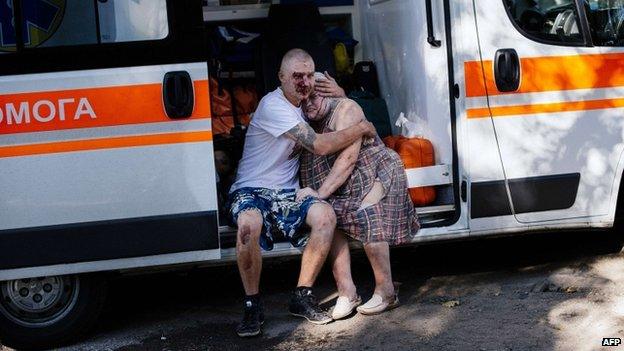
A new UN report says civilians are being deliberated targeted in the fighting
A UN report released on Friday, external found that serious human rights abuses had been committed by rebels and Ukrainian forces.
The abuses include the deliberate targeting and killing of civilians trapped in urban areas or trying to flee the fighting via government-established "safe corridors", the study found.
It said that an average of around 36 people had been killed on a daily basis between 16 July and 17 August.

War in eastern Ukraine: The human cost
At least 2,593 people had been killed since mid-April, not including the 298 passengers and crew of the Malaysian Airlines MH17 shot down in the area, a UN report on 7 August said
951 civilians have been killed in Donetsk region alone, the official regional authorities said on 20 August
Official casualty counts only record certified deaths while in some particularly dangerous parts of the war zone, such as Luhansk region, victims are said to have been buried informally, for instance in gardens
Rebels (and some military sources) accuse the government of concealing the true numbers of soldiers killed
155,800 people have fled elsewhere in Ukraine while at least 188,000 have gone to Russia.
Have you been affected by what's going on in Ukraine? Tell us your story by emailing us at haveyoursay@bbc.co.uk, external